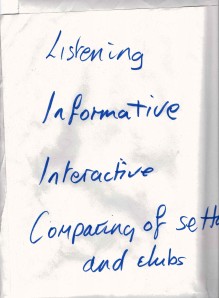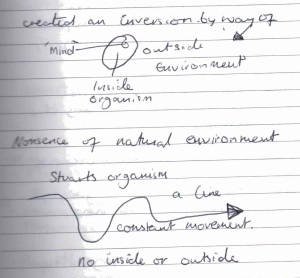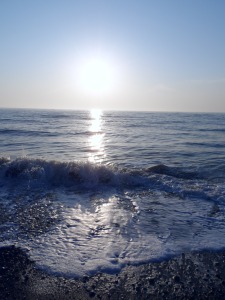The past two days I took up residence alongside another 300 playworkers, all who were in Eastbourne to come together for the National Playwork Conference. This year was my 4th year attending and I decided for the first time I had made a plan of sessions to attend that i will stick to.
I turned up slightly early on the Tuesday morning giving myself a wee bit of time to play on the beach, and with the sun shining on the sea, I spent a few minutes throwing stones and watching for the splash (the bigger the better).
Here’s just a few notes from the sessions I attended:
The day started it’s journey with Patrick Bateson, a behavioural biologist and although I never understood all of what Patrick was going on about, I took abit of it in and found what I did understand interesting.
Patrick who had almost 50 people listening to his ‘words of wisdom’ spoke about Epigentics. Initially Patrick went through the process of explaining how smiles can be changed via expereinces.
The innate ‘not learned’ and ‘part of behavioural system’, comparing David Cameron and a Blind man who show very different smiles although smiling, their experiences can be shown through the way they smile.
Genes -> Instint
Environment -> Acquired behaviour
The way a child smiles changes through voices the child hears at an early age. for example Patrick says a child who listens to his/her mothers voice will develop at an higher rate whereas a a child who is used to listening to his mother but hears another voice will be at a lower rate.
(some of this may not make complete sense, but its a great way of me trying to straighten the thoughts out in my heads)
Epigentics was almost unknown 15 years ago, but by looking at the statistics regarding how many papers have been written, Patrick showed us how there has been a major increase in numbers.
‘The need to understand the processes of development that unlike the interactions between the devloping organism and it’s environment’ Waddington, (1957) He called this ‘Epigentics’
To some up Patrick explains Epigenetics as a way to tell us about the details of the development process.
The next session I attended was facilitated by Professor Perry Else (Congratulations Perry!) and Perry was speaking about ‘Taking risks; how low can you go’. I had never heard Perry speak or present a session before so I went in with an open mind of not knowing what to expect, I was not disappointed. Perry looked into the feelings people had about children and racism, bullying, swearing, and lots more, the stuff that playworkers sometime struggle with when it appears in the play setting.
The main point that I got from Perrys session was that it’s all about the word ‘Intent’, the context the children are using the language they use. Whilst discussing the topics it took me back to a previous expereince where I had been present. A young coloured boy was playfully playing with another group of children who sometimes took things a bit to far, mainly because of the young boy being a bit to in their faces. This one day they called the boy (in a joking kind of way)a Paki. Now was this ok or not, well I immediently intervened by confronted the group, asking if they felt it was alright, I was interrupted by the young boy ‘But I am a Paki!’. I had a dilemma, and thats when I realised how Playwork is one huge dilemma in many different ways.
P = C + E + S
‘Children are the experts in their own playing’ Something to remind people of every so often
Karen Benjamin’s session was next which looked at the Playwork Priniciples and the role of the playworker.
The work around principles 3-8 came as a refresher to myself, but also a way of finally hearing people like Karen and Simon Rix speak about something they are also passionate about. I have to include how absolutley mad Karen is, jumping and almost dancing around the room. It was just brilliant!
Along with the Dudley crew I was looking to pick out the ‘important’ bits of principle 7, easy stuff! Anyhow next…
Polly Charlton ended the day with her Advanced take on the Play Cycle. focusing on the metalude and containment we were pulled together as a group and asked to critic Pollys recent thoughts, by taking a look at her wall of thoughts and post our own thoughts up alongside them.
Slightly taken back by the middle of the wall, I took a few moments to digest what was in front of me and all I seemed to manage to post up was ‘tell me more’, unfortunately, but fortunately we never got that far as we listened to Perry explain the metalude. I have to say I became slightly confused when Perry described it as an invisible motion, something that can not be seen, especially when sometimes children are clearly in some kind of motion before the play cue. So…sorry Perry, I have to disagree slightly with both Gordon and you’re theory of the play cycle if it’s how I understand it. If the metalude is invisible then what comes before the cue that we can clearly see, and is not so invisible?
Right, it’s pub time! (Yay), a quick drink in the pub before heading back to the conference for dinner and entertainment.
The evening of Tuesday raised the bar for entertainment once again, just as you think it can not get much better, the efforts Meynell and his team go to organising the conference if great. The evening offered more than just a space to drink, dance and be silly, it gave us more time to appreciate the efforts people go to throughout the sector in providing play spaces for young people.
I know I do it each year but the fire jugglers were just amazing, I just wish with a little more practice I could do some of the tricks they were doing, but as we kept telling ourselves..There’s always BOP!
Wednesday was the day of days for me! It would be the first time of becoming the facilitor instead of the participant.
Before I was due to present I had the opportuntiy to attend Wendy Russell’s session titled: The only is Ethics, Wendy a lecturer at the University of Gloucestershire never fails to provoke a fresh thought. The whole Ethics thing is something that I finds brings out a lot of discussion once in full flow, more so this time when we gathered as small groups and I found myself with Bob Carney, Jess Milne and Bridget Handscomb, so much experience between them and Jess always has a new story to tell.
Anyway we were asked to think about a cultural dilemma we may have faced whilst in face to face playwork, then the dilemma itself, it needed to be one that could be shared with the whole group (oh dear!). We got straight into thinking around the matter, and Jess the darling he is shared a really interesting story, and it was just a pity we did not a little more time to reflect over his actions. Time is precious and flies by.
I found myself getting slightly immersed by the next part where Wendy discussed both the theory of doing (Immanuel Kant) and theory of being (Aristotle; MacIntyre), hense why I lost track of note taking.
On leaving I had one sentence stuck in my head, Wendy said ‘Playwork itself maybe unethical’. So there we go…
It was time…The yellow brick road to Playwork via Childhood was just half an hour away, and to be honest I was shitting myself, I was not sure how many people would turn up, or how I would react to questions when they thrown in my direction. It was a whole new experience, the preparation that was neither complete or certain to fit with the participants that were dropping in.
I set up with imagination and silliness in mind, opening the powerpoint ready to start. Introductions guided me with the direction of the session, and within five minutes of starting I found myself going off track.
 Beginning with a game of stuck in the mud to get the brains motivated for discussions, I gave out minimal rules that they must go underneath legs to free someone. It was supposed to offer a point of discussion for later on in the session but time ran away with itself once again, 90 minutes is just not enough. The rules adapted as the game went on with people running and almost having a game of tag, just like childs play. As we entered back I began to get the participants of their childhoods, sharing stories in groups and questioning how they played, whether adults were around, whether they would allow children as a playworker to play how they played as a child.
Beginning with a game of stuck in the mud to get the brains motivated for discussions, I gave out minimal rules that they must go underneath legs to free someone. It was supposed to offer a point of discussion for later on in the session but time ran away with itself once again, 90 minutes is just not enough. The rules adapted as the game went on with people running and almost having a game of tag, just like childs play. As we entered back I began to get the participants of their childhoods, sharing stories in groups and questioning how they played, whether adults were around, whether they would allow children as a playworker to play how they played as a child.
Using just 3 slides from the powerpoint, I realised its all about the flow of the session, working out where the participants are at and how to best get them engaged in discussion. 
We covered many different topics including generations of play, which fed off to other links, or should I say connections of what we did including playing with animals etc.
The feelings I felt throughout the session were strange, I was the focus of the session with people following what I said although expressing their own opinions, I can only discribe it as bizarre but slightly cool.
 Some feedback from participants:
Some feedback from participants:
Defo doing it again as long as Meynell will have me back!
Back to being the participant again for the final session, Stuart Lester. What an interesting session! Principle 2 put across using Jack and the Beanstalk where the Giant was obviously the hero 😉 and we were reminded to think differently, although as Stuart said ‘Think differently- although it’s not different because the process is the same’ Wise words.
 Studying organisms Stuarts way I actually understood (Yay). It was what it said on the label, brain power. So here is just a few notes I took away from the session.
Studying organisms Stuarts way I actually understood (Yay). It was what it said on the label, brain power. So here is just a few notes I took away from the session.
Organisms don’t move like Stuarts organism but instead they move with and through the shaping of the world, do playworkers move like Stuarts? or like the rest of the formated public?
Hopefully like this…
The way we use childrens rights, we are maybe isolating the children.
Playwork as a compossibilty.
The thing about Playwork is we all have our moments of hope, those moments where we hope for things to be different.
Stuarts says ‘Playwork is a political act’






[…] already posted up, or will no doubt post up, their experiences and learnings (I’ve just read Vicky Edwards’ reflections on her experience of conference — good stuff, Vicky, by the way). I have been […]
Good stuff! 🙂 (I like those little handwritten notes embedded in your post, by the way: it gives it all a feel of some sort of ‘ongoingness’!)
Great thinking! 😉
very interesting , your notes make the case of describing conference well
Thanks for taking the time to have read of my blog guys 🙂 I’m planning on adding some more thoughts very soon, looking at the more specific ideas I have after coming back from conference.
thanks vicky good to read